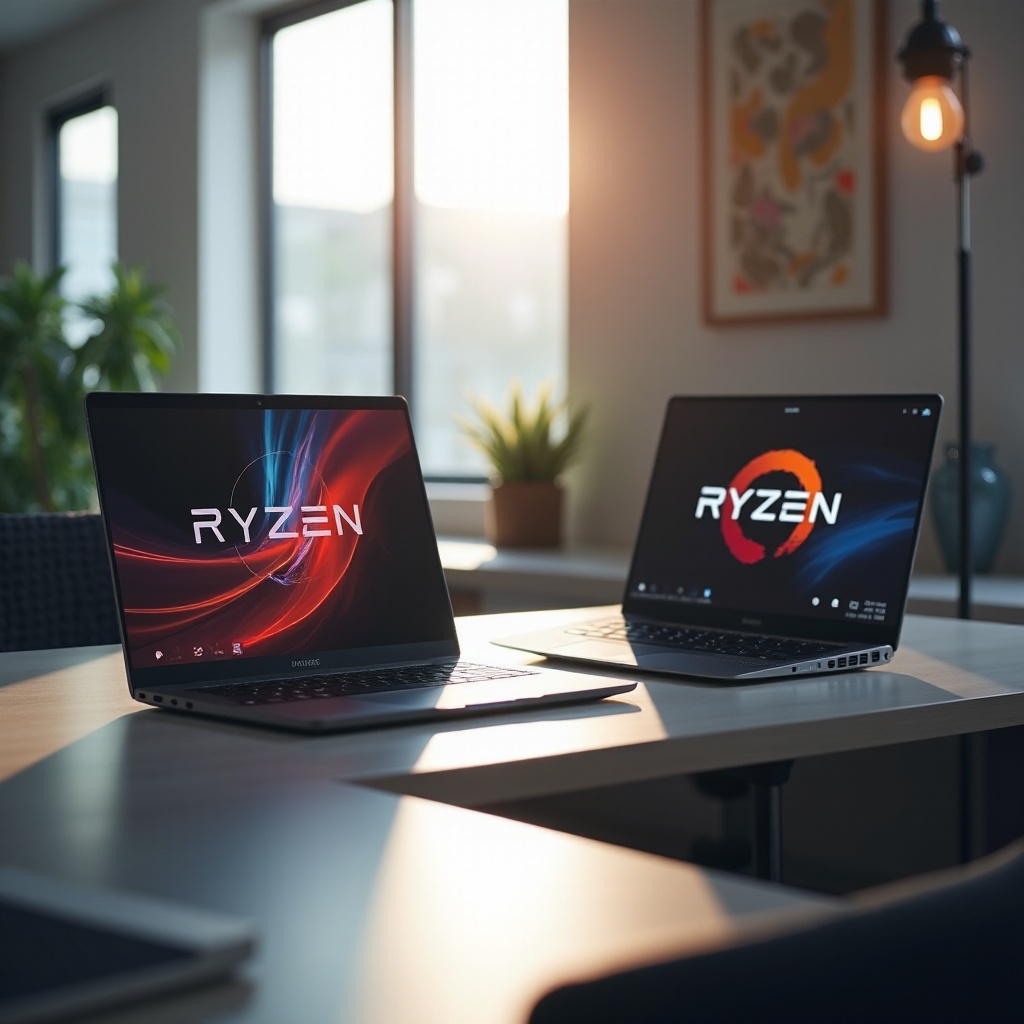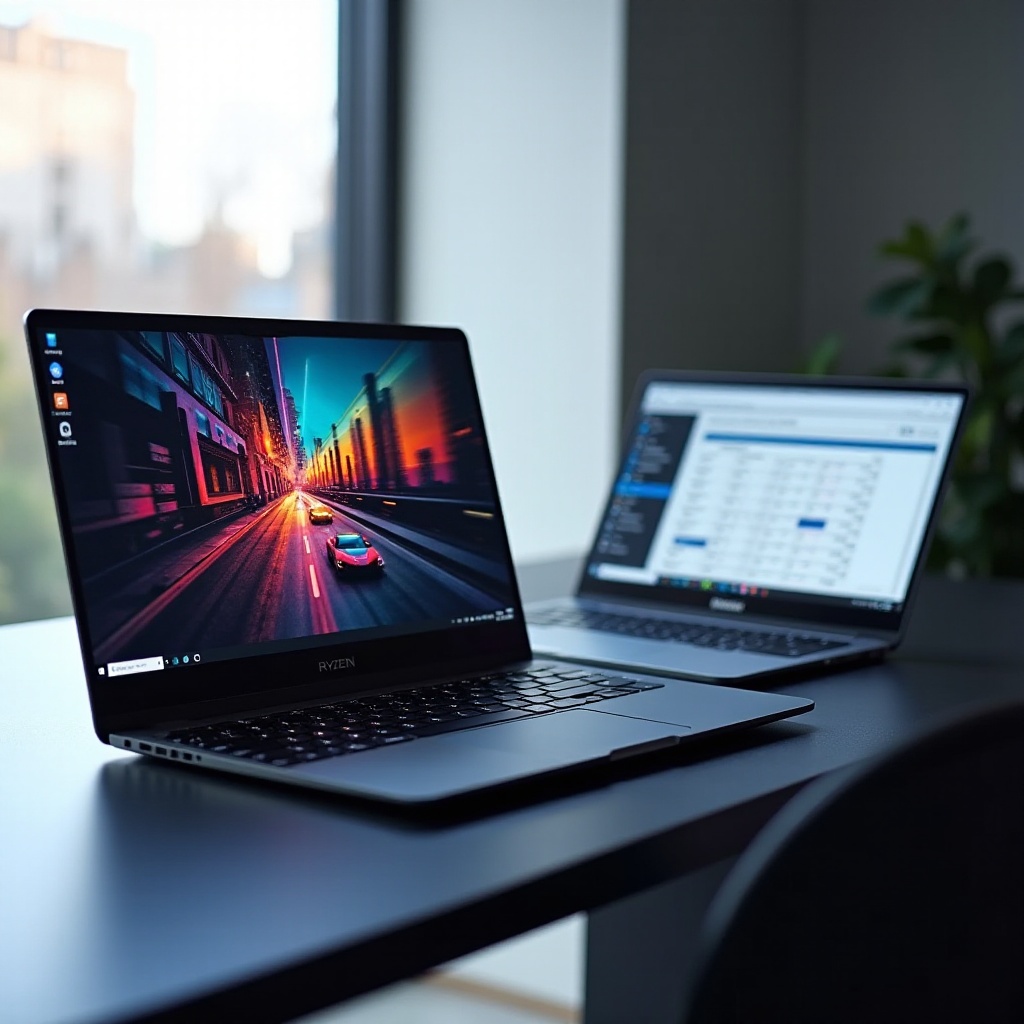Ryzen 5 vs i5 Laptop: Which Is Better for 2024?
Introduction
Comparing the Ryzen 5 and the i5 processors can be challenging when considering a new laptop for 2024. These two processors dominate the market, and choosing between them requires understanding their unique strengths. This blog delves into the performance, power efficiency, price, and ideal uses for each processor, helping you decide which suits your needs better. Whether you're a gamer, a business professional, or a content creator, this guide will provide clarity on which choice between the Ryzen 5 and i5 will benefit you the most this coming year.

Understanding Processor Basics
Processors are the brain of your laptop, responsible for executing tasks and running software. Two of the most popular choices are the AMD Ryzen 5 and Intel i5. The Ryzen 5, known for its strong multi-core performance, utilizes AMD's advanced technologies to boost performance. On the other hand, Intel’s i5 series is celebrated for its balance between power efficiency and strong single-core performance, making it a reliable choice for a variety of uses.
Comparing the two involves looking at their architectures, core numbers, and clock speeds. Ryzen 5 typically offers more cores and threads, which is advantageous for handling multiple tasks simultaneously. Intel’s i5, meanwhile, often excels in applications that favor higher clock speeds and single-core performance. Understanding these basic yet crucial differences lays the groundwork for a more detailed comparison of these processors.
Performance Comparison
Performance is a critical factor when choosing a processor. Let's compare these two processors based on benchmark scores, real-world applications, and multitasking abilities.
Benchmark Scores
Benchmark scores offer a quantitative method to compare processors. Ryzen 5 processors often score higher in multi-threaded benchmarks due to their increased core and thread count. However, i5 processors tend to perform better in single-threaded benchmarks, making them ideal for tasks that do not leverage all cores, such as certain games and software applications.
Real-world Performance
In real-world scenarios, both processors perform admirably in everyday tasks such as browsing, streaming, and document editing. The choice between the two becomes significant during more intensive tasks. For instance, Ryzen 5 shines in applications like video rendering and 3D modeling, thanks to its superior multi-core performance. In contrast, the i5 excels in tasks requiring high single-core speeds, such as certain games and single-threaded applications.
Multitasking and Productivity
When it comes to multitasking and productivity, the number of cores and threads plays a crucial role. Ryzen 5’s higher core count allows users to run multiple applications simultaneously without a hitch. This multitasking advantage is crucial for users who need to switch between tasks frequently, such as content creators or software developers. The i5, though slightly behind in multi-threaded tasks, still offers solid performance for regular productivity tasks, ensuring a smooth and responsive experience.
Power Efficiency and Thermal Management
Power efficiency and thermal management are essential considerations, especially for laptop users who rely on battery life and cooling systems.
Battery Life
Intel’s i5 processors are generally more power-efficient, offering better battery life in laptops. This is particularly important for users who are constantly on the go and need their laptop to last through the day without frequent charging. AMD has made strides in improving the power efficiency of Ryzen 5, but it traditionally consumes more power, resulting in slightly shorter battery life.
Heat Dissipation
Heat management is another critical area where these processors differ. Ryzen 5 tends to generate more heat due to its higher core count and power consumption. Efficient heat dissipation mechanisms are necessary to prevent overheating, which can throttle performance and shorten the lifespan of the laptop. Intel’s i5 processors, being more power-efficient, produce less heat, thus benefiting from better thermal management and potentially quieter operation with less need for aggressive cooling solutions.
Price vs. Value
Price can be a decisive factor when choosing between Ryzen 5 and i5 laptops. Generally, Ryzen 5 laptops offer better value for money, delivering higher multi-core performance at a comparable or lower price than their i5 counterparts. This cost-effectiveness makes Ryzen 5 an attractive option for users on a budget who still need robust performance.
Intel’s i5 laptops, while sometimes more expensive, justify the price with their superior power efficiency, reliable single-core performance, and extensive brand trust. The slightly higher cost can be worth it for users prioritizing battery life and stability.

Ideal Use Cases
Both Ryzen 5 and i5 processors are versatile, but certain use cases highlight their strengths.
Gaming
Gamers will find a tough choice between the two processors. i5 processors are traditionally favored for gaming due to their strong single-core performance, which many current games require. However, Ryzen 5 offers impressive multi-threaded performance, which newer game titles optimized for multiple cores can leverage, making it a great option for future-proofing your gaming setup.
Productivity and Business Use
For productivity and business use, the choice depends on specific requirements. The i5’s power efficiency and strong single-core performance make it suitable for office tasks, including handling large spreadsheets, managing emails, and running presentations. Ryzen 5 excels in productivity environments that benefit from multi-core performance, such as software development and running virtual machines.
Multimedia Editing and Content Creation
Content creators and multimedia professionals will benefit significantly from Ryzen 5’s superior multi-core performance. Tasks such as video editing, 3D rendering, and audio production can take advantage of the additional cores, resulting in faster processing times and smoother multitasking. Although the i5 is capable in these areas, Ryzen 5 offers a clear edge for demanding creative workflows.

Conclusion
Both Ryzen 5 and i5 processors have their distinct advantages. The best choice depends on specific needs and budget. Ryzen 5 offers excellent multi-core performance and value for money, ideal for content creation and multitasking. The i5 excels in power efficiency and single-core tasks, making it suitable for gaming, business use, and general productivity. Evaluating your primary usage and preferences will guide you in choosing the processor that best aligns with your needs for 2024.
Frequently Asked Questions
Which is better for gaming, Ryzen 5 or i5?
i5 generally offers better single-core performance, often beneficial for gaming. However, Ryzen 5’s multi-core strengths future-proof it as more games optimize for multi-threading.
Are Ryzen 5 laptops more affordable than i5 laptops?
Typically, Ryzen 5 laptops provide a better performance-to-price ratio, making them more cost-effective for users needing strong multi-core performance.
How do Ryzen 5 and i5 compare in terms of battery life?
i5 laptops usually offer better battery life due to their higher power efficiency, making them ideal for users who need extended use without frequent recharging.



